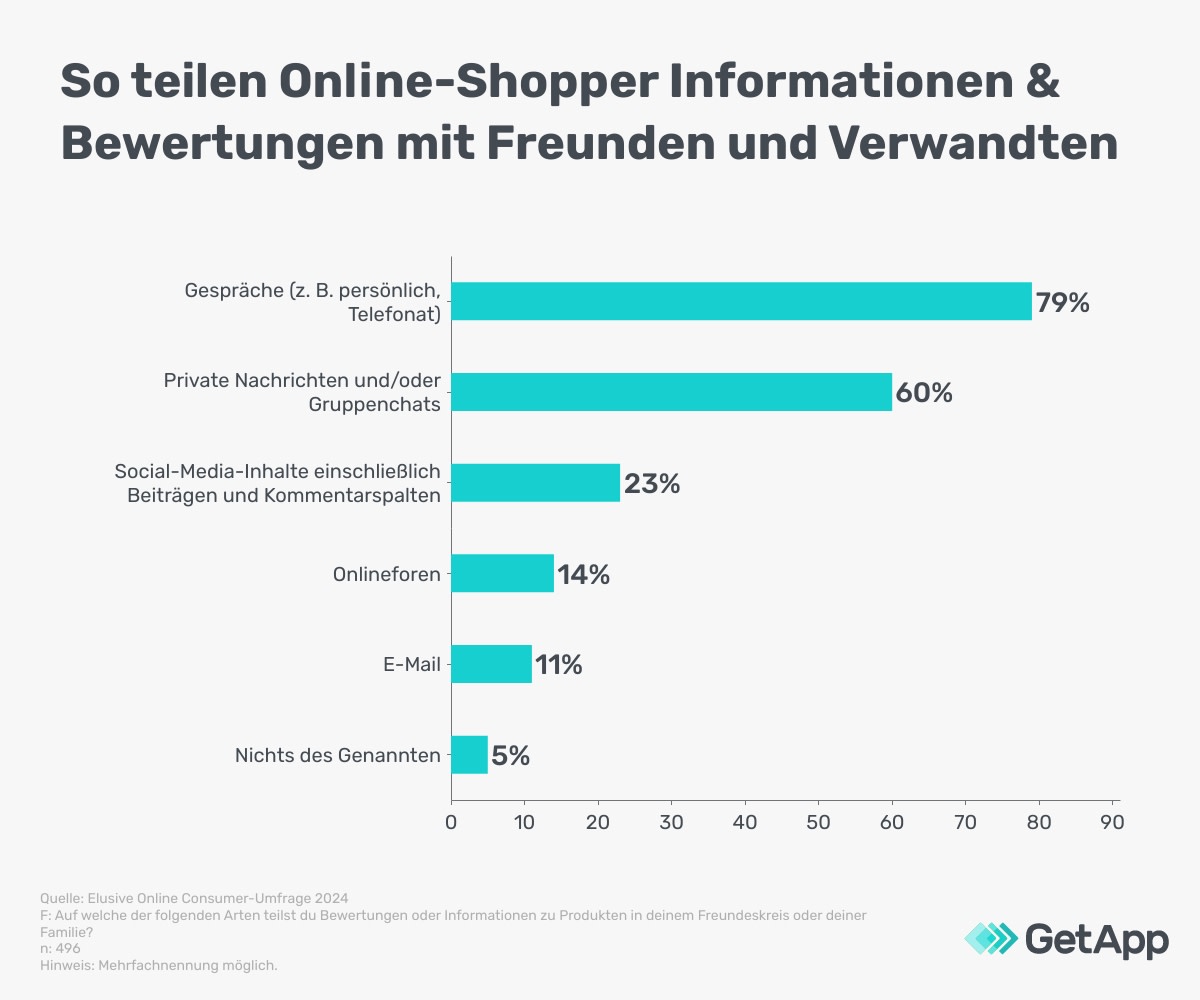Social Shopping: How Social Media Shapes Consumer Behavior
60% share product information with friends or family through Dark Social, and 71% don’t want social media companies to know what they buy: Learn how social media impacts consumer behavior and what businesses can learn from it in our new study.

Social media plays a crucial role in shaping consumer behavior, enabling users to discover products, gather information, build trust, connect with other customers, and share their experiences. However, consumer behavior in social shopping is changing: According to GetApp’s 2024 Elusive Online Consumer Survey, 60% of online shoppers share reviews or product information with friends or family through private messages or group chats.
As our data shows, the trend toward “Dark Social” media is becoming increasingly popular. Many consumers are shifting away from traditional social media platforms in favor of private group chats, where their valuable personal information is harder to track. A similar trend can be seen in the rise of “Deinfluencing,” a counter-movement to traditional influencer marketing.
The Rise of Dark Social and Deinfluencing: New Challenges for Social Media Marketing
With these insights, small and medium-sized retailers can make informed decisions about technology investments in their social media marketing strategies to build credibility, effectively target their audience, attract new customers, and enhance their social commerce efforts.
In the first part of this two-part series, we discussed how retailers can optimize their online shops to improve customer experience and increase competitiveness.
Study Highlights:
– Dark Social Media is a challenge for marketers: 60% share product information with friends or family via private messages and group chats, and 71% don’t want social media companies to know what they buy.
– The right social proof influences buying decisions: 70% trust product reviews from non-influencers in social media, while only 17% trust influencer reviews.
– Social media as a sales platform has potential: 41% plan to increase their social media spending in the future.
– Too much advertising can alienate consumers: 49% have blocked certain ads, 31% have blocked specific brands, and 13% have deleted their social media accounts.
– Personalization is the key: 50% find ads for products matching their interests acceptable.
– Dark Social on the rise: 71% don’t want social media companies to know what they buy.
Most online shoppers (55%) rely on review sites or friends and family (51%) when seeking trustworthy product reviews. When it comes to trying new brands or retailers, 46% trust recommendations from friends or family.
This reliance on personal networks highlights the growing influence of Dark Social, where people tend to trust the opinions of those they know personally.
What is Dark Social Media?
Dark Social refers to the private sharing of content through messaging apps, emails, or direct URLs that are not publicly visible and, therefore, difficult to track. As more people use private channels to share content, Dark Social has gained significance. This type of sharing takes place outside of standard web analytics, making it challenging for social media marketers to identify traffic sources.
The shift to private sharing is evident in the following numbers: The most common ways people share reviews or product information with friends and family are through personal or phone conversations (79%) or private messages and group chats (60%).

The impact of Dark Social media extends beyond just reviews and is reflected in purchasing decisions as well: 30% of consumers say they frequently make purchase decisions based on content shared with them through private social media channels.
One reason for the rise of Dark Social media could be the sense of privacy and control it offers consumers over their data—an increasingly attractive feature in an era of growing concerns about data privacy. Our findings support this hypothesis, as 71% of respondents do not want social media companies to know what they purchase.
How Social Media Marketers Can Integrate Dark Social Into Their Strategy
For small and medium-sized retailers, the growing significance of Dark Social presents a major challenge. Tracking customer interactions and collecting valuable data on preferences becomes significantly more difficult when these interactions take place in private or semi-private spaces. Traditional marketing strategies that rely on public social media interactions and easily accessible customer data are less effective in these environments.
Here are three tips for incorporating Dark Social into your company’s social media strategy:
1. Use advanced social media analytics tools: Leverage tools that detect and analyze interactions with your content and track broader social trends.
2. Implement UTM parameters: Add UTM tracking codes to URLs to identify traffic sources. These parameters help determine where traffic is coming from and analyze how well content is performing in private channels. Many social media management tools offer integrated features for adding UTM parameters to the links you share.
3. Enable social sharing buttons: Add share buttons with tracking features, allowing you to track where and when content is shared, even on private channels.
The Power of Social Proof: 69% Trust User Reviews, While Influencers Lose Influence
Social proof, such as customer reviews or influencer endorsements, plays a crucial role in guiding consumers’ decisions online. In fact, 64% of respondents said user reviews were the most important factor in their decision to purchase new products or services online over the past 12 months.
What is Social Proof?
Social proof refers to the tendency of people to look at others’ behavior as a guide for their own actions. On social media, people can share their opinions, reviews, and experiences, which can serve as a form of social proof for others. Likes, comments, shares, and follower counts on social media platforms give users a sense of how popular or accepted certain content, products, or services are. This, in turn, can influence them to positively view or consider purchasing those items.
Social proof is especially important in social media marketing. In fact, 57% of participants who start their product search on social media cite trustworthy product reviews as one of the main reasons they use social platforms for online shopping.
Further highlighting the importance of customer reviews, 70% of survey respondents agreed with the statement: “I trust product reviews from people on social media who are NOT influencers.”
In contrast, influencers fare much worse. Only 17% agreed with the statement, “I trust product reviews from social media influencers.”
The rest of the study, authored by Rosalia Mousse, Content Analyst at GetApp and Master’s graduate of HHU Düsseldorf, can be found on getapp.de.